March 2024
When it comes to business process outsourcing, there is quite literally a world of options available. Navigating the global outsourcing landscape has become a critical strategy for companies seeking to enhance efficiency, reduce costs, and tap into specialized expertise not readily available in-house. However, this journey is fraught with challenges, including physical distance, cultural differences, language barriers, and the need to maintain quality standards on a global level. While we frequently compare onshore/nearshore/offshore outsourcing, in this article, we will break down the various international regions, both traditional and emerging, and weigh up the pros, cons, pricing, and other key comparisons in these markets.
Key Metrics

Africa
PROS: Africa is an emerging outsourcing destination with a young, dynamic, and increasingly tech-savvy workforce at competitive rates. It also has diverse linguistic capabilities, with English, French, and Portuguese proficiency, providing an additional advantage. Some African countries are improving their IT infrastructure and business environment to attract foreign investment, indicating a growing readiness to support outsourcing operations.
CONS: Infrastructure remains a genuine concern in many parts of Africa, with internet reliability and electricity supply affecting business operations. Political instability and regulatory uncertainties can also threaten business continuity and security. While labor costs are lower, the initial setup involves significant investment. Companies must also navigate cultural differences and manage time zone variations, which impact communication and workflow.
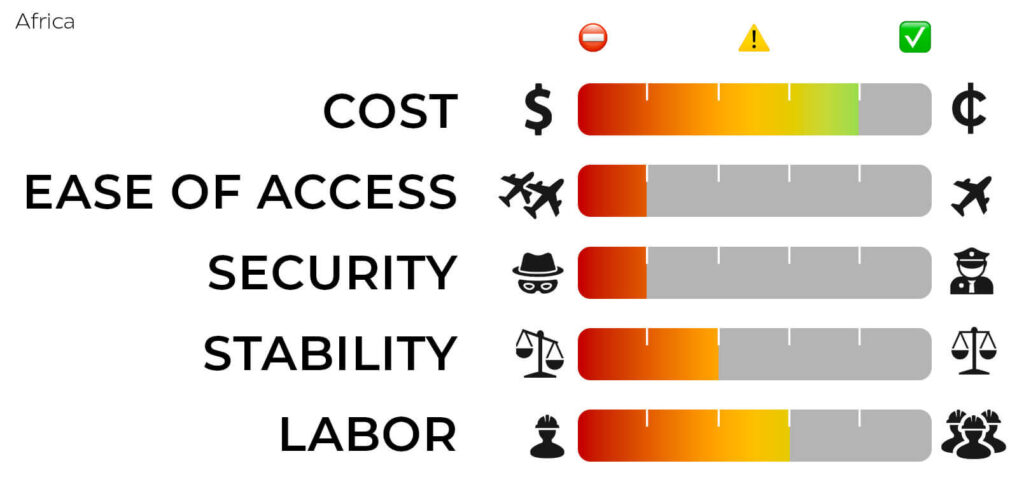

Asia Pacific
PROS: A more traditional destination, Asia Pacific boasts a vast pool of skilled, educated workers proficient in technical and customer service roles with lower labor costs. Countries like India and the Philippines have established a strong reputation for English-speaking IT and call center services. Additionally, time zone differences can be leveraged to provide round-the-clock services for global clients.
CONS: There are many challenges to consider. Cultural and communication barriers affect understanding of business nuances and customer interactions. Rising wages in popular outsourcing destinations within the region will narrow the cost advantage over time. Infrastructure can vary greatly depending on the location, and political stability and regulatory environments also differ across the region.
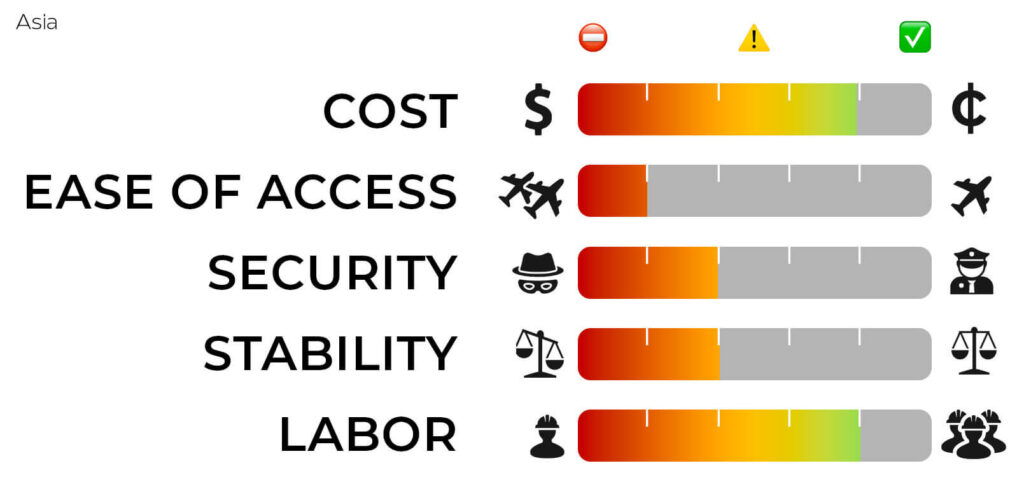

Caribbean
PROS: The Caribbean provides a closer cultural and geographic proximity to North America and reduces the issues of time zone differences, facilitating easier access and communication. English is the primary language across most of the Caribbean, and proficiency is the highest across all outsourcing locations. Plus, with a growing, educated workforce, labor costs in the Caribbean are significantly lower than in North America, offering cost savings and better performance without the distance involved in offshoring.
CONS: Not all Caribbean Island nations are the same, so companies should look to outsource to top-tier, primarily English-speaking destinations with greater talent pools, such as Barbados, Grenada, and St. Lucia. While infrequent, the region can be exposed to natural disasters like hurricanes, though most providers offer ample redundancy and robust contingency planning.
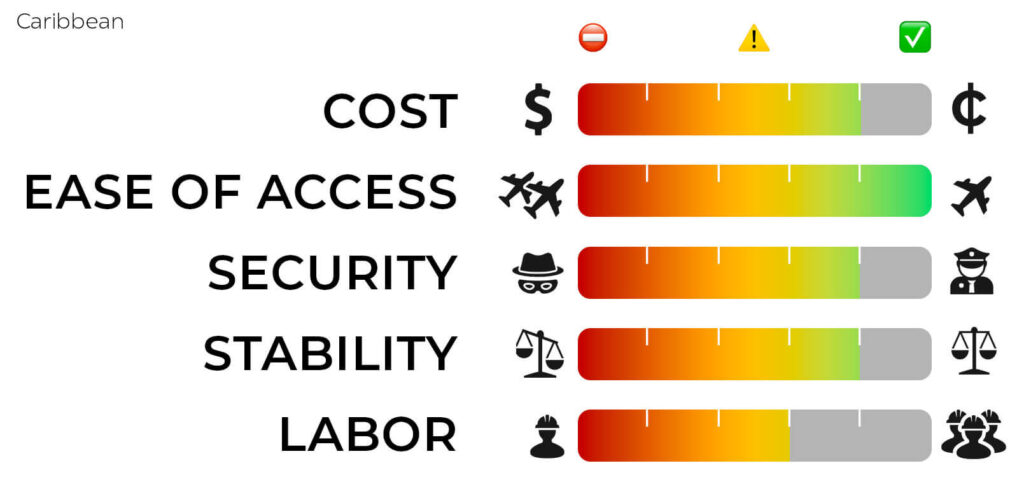

Europe Eastern
PROS: A key advantage of outsourcing to Eastern Europe is the region’s high level of technical education and expertise, especially in IT and engineering fields, offering access to a skilled talent pool with strong capabilities in software development, cybersecurity, and other high-tech areas. Labor costs in Eastern Europe are generally lower than in Western Europe and North America, providing cost savings while maintaining high quality of work.
CONS: There is a potential for language barriers outside of professional settings, although English proficiency is generally high among professionals. Geopolitical, economic, and infrastructure stability can vary across the region, with some countries experiencing more volatility than others, which could impact business operations and long-term planning. Time zone differences, while less pronounced than with Asian destinations, will require adjustments.
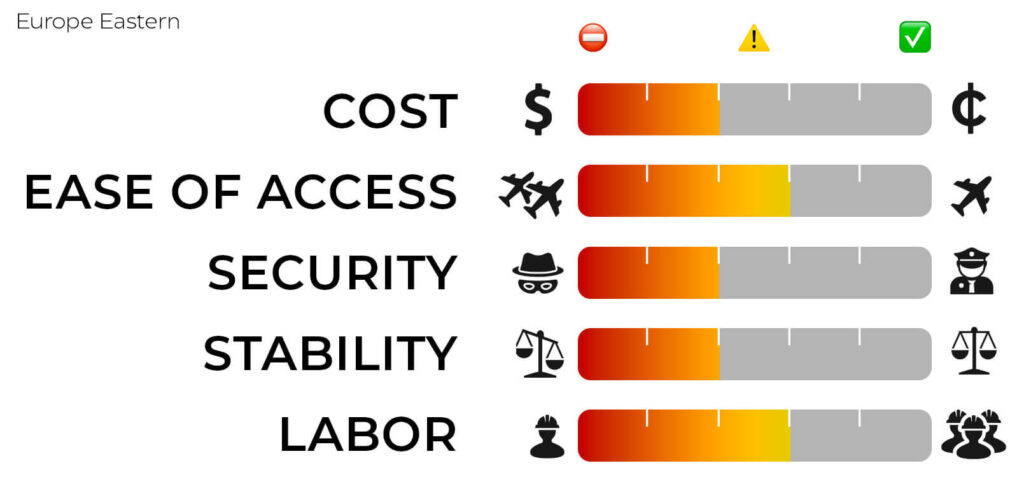

Europe Western
PROS: Western Europe offers a highly educated and skilled workforce with solid expertise in various fields such as finance, IT, and creative industries. The region is known for its robust infrastructure, advanced technology, and strict adherence to quality standards and data protection laws, such as GDPR, providing a secure environment for business operations. The cultural and business practices are also closely aligned with North American standards.
CONS: Labor costs are significantly higher than those of other outsourcing destinations, and the high cost of living and strong labor laws contribute to these higher costs. While the closer time zones can be beneficial, they offer less advantage for companies looking to achieve round-the-clock operation. Additionally, language barriers may still exist, depending on the specific country and sector, though the level of English proficiency is generally high across the region.
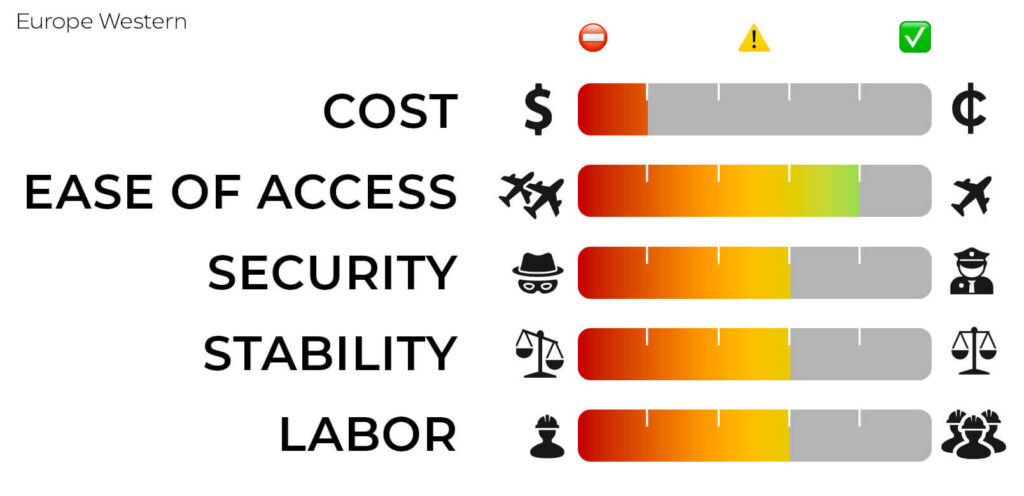

Latin America
PROS: Latin America is geographically and culturally close to the U.S., with similar time zones. This proximity allows for real-time communication and faster response. Latin America boasts a growing, educated workforce with proficiency in English, alongside native Spanish, a necessity with growing demand for bilingual services and Portuguese. The region also presents competitive labor costs, which lead to significant cost savings.
CONS: The many countries offering outsourcing in Latin America are not all equal. The region has varying degrees of political and economic stability, and IT and infrastructure can still be inconsistent. Higher-ranked destinations such as Colombia, the Dominican Republic, and Honduras should be considered more premium outsourcing locations when weighing up the region as a whole.
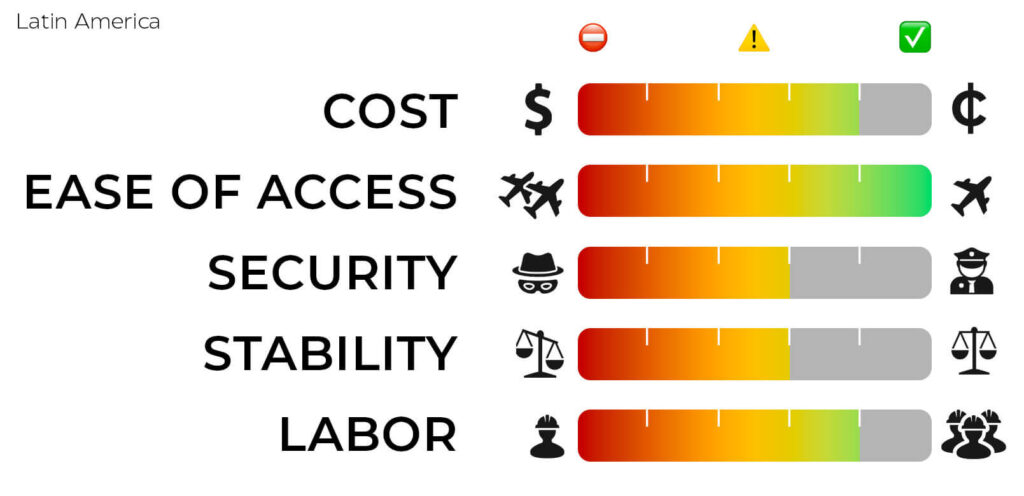

Noth America U.S & Canada
PROS: Outsourcing within the U.S. and Canada offers significant advantages, including a high level of alignment in terms of business culture, language, and legal standards, which greatly facilitates communication and project management. There’s also a high degree of data security compliance, reducing legal and operational risks. Working in the same or similar time zones can enhance collaboration and allow for real-time decision-making.
CONS: The primary con of onshore outsourcing is the much higher cost. Labor costs and attrition in the U.S. and Canada are significantly higher than in many offshore or nearshore outsourcing destinations, which can reduce the cost savings that companies typically seek from outsourcing. Additionally, while highly skilled, the talent pool may be more limited in certain specialized areas compared to global markets, potentially leading to competition for top talent.
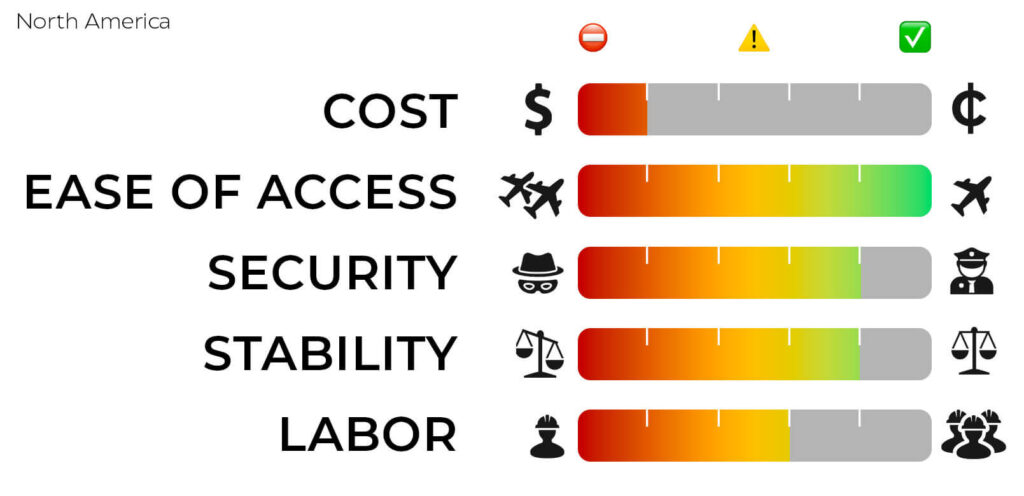

An effective outsourcing strategy should enhance a company’s brand and balance cost savings, performance, and flexibility to ensure that your outsourcing partner can adapt to your needs as your customer base grows. With so many options available, it’s easy to lose sight of the goals that better benefit the end customer, such as cultural affinity and linguistic options, making for smoother interactions.
Nearshore options, such as the Caribbean and Latin America, offer a compelling suite of advantages, making it a preferred choice for many North American businesses. The proximity factor facilitates better communication, coordination, and collaboration. It also enhances cultural compatibility and understanding, reducing the likelihood of misunderstandings and miscommunications that can occur with more distant options.
Nearshore outsourcing also allows for more accessible travel and face-to-face meetings, further strengthening the partnership and ensuring project alignment. Additionally, nearshore regions often have a high level of education, technical expertise, and fluency in the client’s language, which ensures high-quality output. These factors combined make nearshore outsourcing the most effective strategy for companies looking to leverage the benefits of outsourcing while minimizing the challenges associated with distance, language barriers, and cultural differences.
About KM² Solutions
KM² Solutions ( KM2 Solutions ) is an award-winning BPO with over two decades of experience operating an exclusive nearshore strategy throughout the Caribbean and Latin America. KM² provides outsourced inbound and outbound customer service contact services for voice, chat, email, and mobile to clients in financial services, multi-unit healthcare, insurance services, travel & hospitality, eCommerce, technology & telecommunications, home services, and other sectors. The company provides clients with a host of solutions, including customer support and care, telesales & retention, claims management & processing, appointment setting & schedule management, loan origination & verifications, back-office processing, and technical support. KM² Solutions maintains PCI DSS compliance, completes an annual SOC 2 audit, and has a Compliance Management System that meets the FDIC standards.




